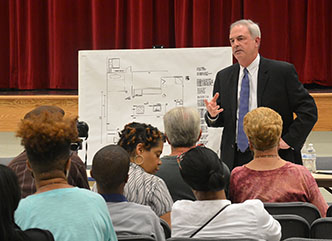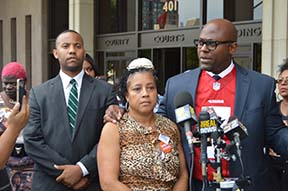
With a wrongful death civil lawsuit filed against Baltimore County Police Department and the NAACP requesting that County Executive Kevin Kamenetz initiate an independent review of the department’s policies and practices, issues involving the Aug. 1 police shooting of Korryn Gaines continue.
One thing that has been decided is that Baltimore County State’s Attorney Scott Shellenberger found that the tactical officer who fatally shot the 23-year-old Randallstown mother of two in her Carriage Hill apartment after a six-hour barricade situation was justified in his actions.
Police had gone to Gaines’ apartment to serve an arrest warrant for a misdemeanor traffic violation and the situation escalated. Police shot first and police bullets also wounded Gaines’ 5-year-old son in the encounter. Gaines threatened them with a rifle, police say.
Based on information provided by Homicide, Baltimore County State’s Attorney Scott Shellenberger announced that his office would not seek criminal charges against the Officer Ruby. “It is truly a tragedy for family and friends,” Shellenberger said at a lightly attended community meeting on Sept. 22 at Randallstown Community Center.
No police officer wakes up thinking that they will have to use their weapon against someone. Any time you point a weapon at a police officer, it is not going to end well. And that is in fact what happened in this case.”
Councilman Julian Jones called the two-hour meeting to present an update on the situation and answer questions. Police Chief James Johnson had accepted the invitation to appear before the community with Shellenberger, but according to Jones, decided not to attend on the advice of the county’s attorney.
Shellenberger met with Gaines’ family members earlier in the week to inform them that he would not be bringing charges against Officer Ruby. Attendees listened intently as Shellenberger went through a very detailed account of the situation. He even displayed a diagram of her apartment that indicated the position of the officers.
Shellenger, who is known for being tough on crime, noted his office’s willingness to bring charges when prosecutors believe an officer is wrong. He reminded the group that he had brought charges against an off-duty police officer, James LaBoard, who choked a Randallstown teenager to death after he believed the 17-year-old and friends damaged his front door. A jury found the officer not guilty of manslaughter.
Attendees asked why less lethal methods were not used, why police chose to get a key from the Carriage Hill management and enter the apartment instead of returning later with the arrest warrant or wait for Gaines to come out.
Baltimore County’s two NAACP organizations have not taken an active role in the case, but the national office has called for an independent investigation.
Sherrilyn Ifill, NAACP Legal Defense Fund president and director-counsel, said in a statement: “We hope to learn everything we can about this investigation. The Gaines family deserves to know exactly how prosecutors reached the conclusion not to press charges. The State’s Attorney and the Baltimore County Police Department must be as transparent as possible about this investigation so that the entire community can understand their decision making.”
The day before Shellenberger announced that he would not press criminal charges, Ifill requested in a Sept. 20 letter that Kamenetz meet with community groups to discuss the appointment of a permanent county independent investigatory team for officer-involved shootings and deaths. Ifill asked for an independent review of the Police Department with regard to its policies and procedures regarding the execution of arrest warrants, including policies regarding the retrieval of keys or forcible entry in cases where the residents do not respond; policies and procedures regarding the deployment of the department’s hostage and crisis negotiation team; and legality of efforts to obtain Gaines’ Facebook information after her death, as well as their reason for seeking it.
Reportedly, Kamenetz has asked Johnson to begin conducting such an inestigation.
Ifill had previously expressed concerns about: the department’s procedures for serving arrest warrants and accessing a key to Gaines’ apartment; Video and/or audio recordings from the day of the shooting; the identity of hostage and/or crisis negotiators involved in the standoff; and the circumstances leading to an escalation into police officers’ use of deadly force after six hours of negotiations with Gaines. The Police Department had responded to Ifill and publicly to those concerns.
All the police officers knew that Gaines had mental health issues and was not taking her medication, Shellenberger said, based on information provided by her boyfriend, Kareem Courtney. Police had gone to the apartment for his arrest also, and he left shortly after police arrived.
In a situation where police investigate the police, the case was investigated by the Baltimore County Police Department homicide unit. Over the course of the last month, Shellenberger said, Homicide has been sending written statements from the officer, downloads from her Facebook page and interviews with people.
When asked if there was any audio or video, Shellenberger just responded that there was no body camera footage and began explaining the county’s body camera program in detail. The camera that police inserted into a hole drilled into the wall from Gaines’ neighbor’s home was for surveillance and had no video, he said.
Attorney J. Wyndal Gordon is representing Gaines’ mother and her estate, and attended the meeting. Gordon stated after the meeting that he did not agree with Shellenberger’s account of the situation. The version the State’s Attorney shared at the community meeting was different from he shared with the family at a meeting in the courthouse earlier in the week to inform them that he would not press charges.
Ramone Coleman is the next door neighbor whose apartment police took over during the barricade. News account reported that Coleman said he heard an officer say that he was tired of this s_ _ _. Shellenberger held up a document he said was Coleman’s statement and that he did not include such a statement. Gordan said Shellenberger declined his request to see the document.
“He has not shaken our position that Officer Ruby shot Korryn Gaines not out of fear but out of frustration,” Gordon said.
“And I do not buy into the fact that Ms. Gaines had been with these officers for seven hours, intermittedly handling her weapon. And as soon as they cut the cameras that Ms. Gaines was operating [Gaines was live-posting video on Facebook] that she became emboldened enough to pick up a firearm and point it in the direction of the officers,” Gordon explained. “There were multiple officers on the scene and only one officer fired the shot. They are all observing the same thing and are in the same area, if you listen to Mr. Shellenberger, when you talk about what a reasonable officer would do. You have everybody seeing the same thing. They fired not one shot, but four shots and through a wall to hit her.”
Gordon questioned why, when news first came out, the police chief didn’t mention that Gaines was shot from behind the wall. He also said that it was a violation of her Fourth Amendment rights to enter her home to serve an arrest warrant for a misdemeanor charge.

